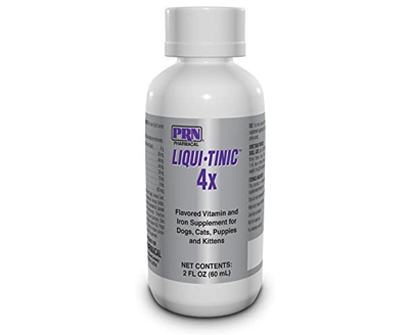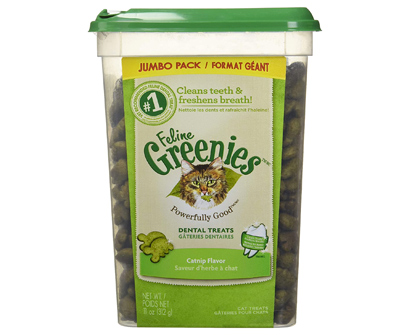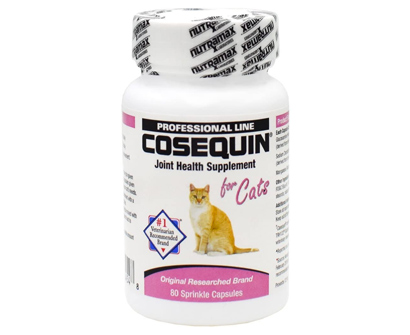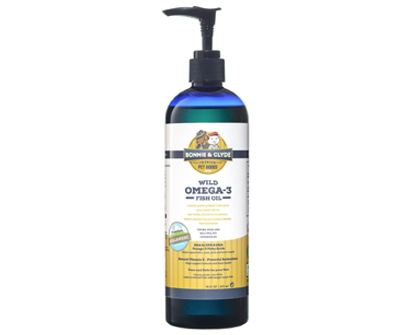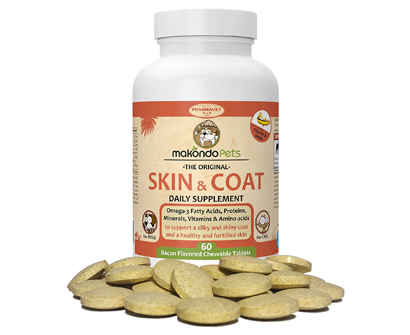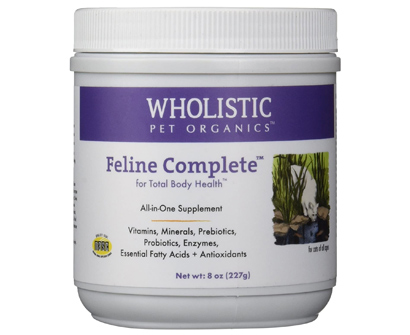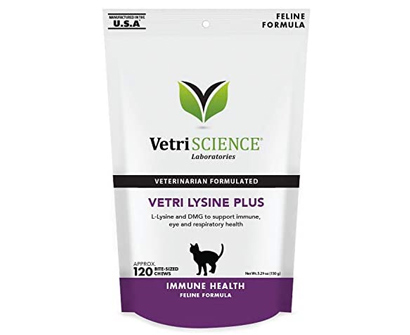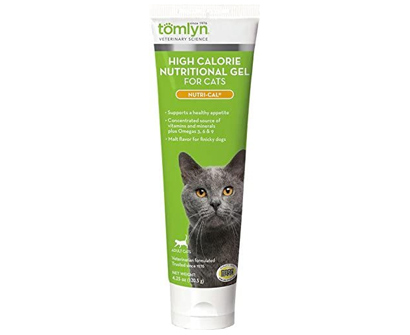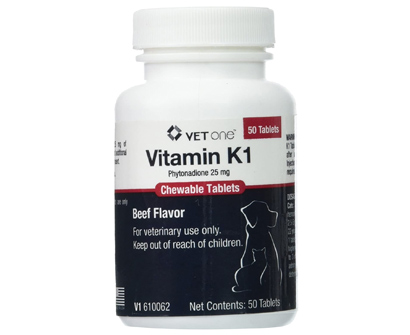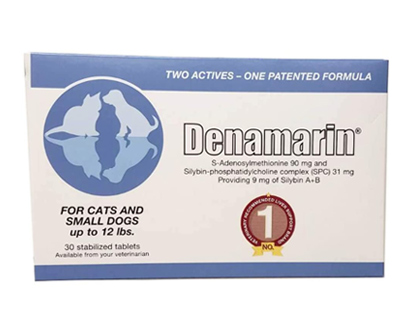The Best Vitamins For Cats in 2022
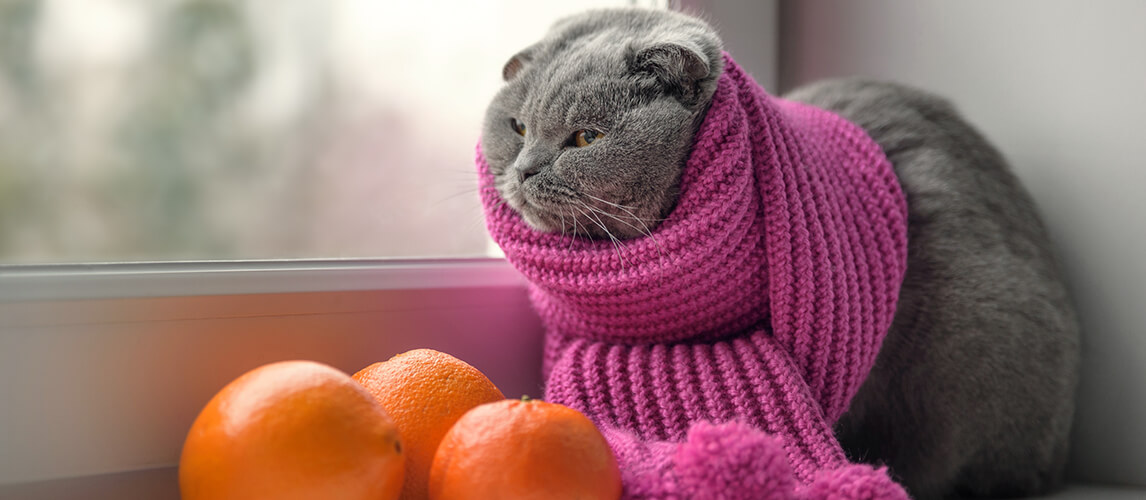
- The Best Vitamins For Cats
- 1. Liqui-Tinic 4x Flavored Vitamin for Cats
- 2. Feline Greenies Dental Treats
- 3. Cosequin Joint Health Supplement for Cats
- 4. Bonnie and Clyde Wild Omega 3
- 5. Makondo Pets Skin & Coat Daily Supplement
- 6. Wholistic Pet Organics Feline Complete
- 7. VetriScience Laboratories Vetri Lysine Plus
- 8. Tomlyn Nutri Cal Gel for Cats
- 9. Vet One Vitamin K1
- 10. Nutramax Denamarin
To keep our cats healthy and happy, we need to provide them with exercise, lots of love, plenty of mental stimulation, and most importantly, we have to feed them a healthy diet. The latter being the most fundamental and yet confusing area of the bunch. With hundreds of different brands and manufacturers available in the US right now, it’s understandable that sometimes there can be information overload when it comes to providing a healthy diet for your cat.
We know that most pet parents love their cats and want them to have the best food they can afford - yet so many people miss out on boosting their kit’s health and happiness through the use of supplements. We know, however, that this is mostly due to choosing to be safe, as opposed to lack of care. So, we decided to do something about it.
Below are our most trusted and loved products when it comes to vitamins for cats. Luckily for you, we’ve not only provided you with a detailed list of the best vitamins for cats, we’ve also broken down all the information available, to help you make a safe, effective choice that’s best for you and your kitty. Read on, and discover the best supplements for your cat, as well as a detailed buying guide to help put your mind at ease.
The Best Vitamins For Cats
1. Liqui-Tinic 4x Flavored Vitamin for Cats
Key Features
Contains iron, vitamins, minerals and amino acids
Liver flavored for easy administration
Suitable for kittens, adult and senior cats
Designed for cats who suffer from anemia, Liqui-Tinic have come up with one of the best supplements on the market for cats, thanks to their flavored vitamin and iron concentrate. This is a top-quality product that plays host to a wide array of vitamins and minerals, including a vitamin B complex, amino acids, and a healthy dose of iron.
This is a highly-reviewed product for a reason – many pet parents have noted huge improvements in their cat’s overall health, especially with their energy, and some even mention improved bowel movements. All-in-all this is a great addition to any cat’s diet who is suffering from low energy and problems with the digestive system- two of the main issues cat owners may come up against as their cats age.
2. Feline Greenies Dental Treats
Key Features
Super-crunchy treats made with vitamins, minerals and taurine
Proven to reduce tartar build-up
Catnip flavor
A hugely popular choice with cat lovers, these Dental Cat Treats from Greenies are crunchy and tasty, perfect for improving your kitty’s dental and oral health. Available in catnip flavor, most felines can’t seem to get enough of the Greenies, making them ideal for pets who may be a little picky when it comes to taking their vitamins!
Proven to reduce tartar build-up as well as improve overall health, these cat supplements come as one of the highest-rated products available online, today. Aside from having a very crunchy texture that helps clean teeth, these treats come with added taurine, vitamins and minerals to give your cat a complete nutritional profile. Head over to our review of healthy cat treats for more alternatives.
3. Cosequin Joint Health Supplement for Cats
Key Features
Healthy dose of glucosamine for cats
Ideal for cats with joint problems
Sprinkle capsule form, easy to adminster
With a heavy focus on providing glucosamine for cats, Nutramax have created their Cosequin pet supplement which is a great option for those who have cats with joint problems. The glucosamine helps to keep joints happy, maintain optimal cartilage health, and gives secondary assistance in maintaining a healthy bladder.
Ideal for aging cats that may be struggling with their joints, these sprinkle capsules are easy to administer (just pop over your cat’s preferred food) and are one of the highest-rated cat supplements online. With over 2,000 happy buyers, you know you can’t go wrong with these vitamins and minerals from Nutramax.
4. Bonnie and Clyde Wild Omega 3
Key Features
Fish oil from sardine, anchovy and mackerel
Packed with essential fatty acids and vitamin E
Supports skin and coat health, heart and liver function
Made from sardines, anchovies and mackerel, this fish oil by Bonnie and Clyde is packed with fatty acids and vitamin E. Tastier than your average fish oil for cats, many owners report that their pets can’t get enough of this delicious oily treat.
Importantly, this pet supplement has passed International Fish Oil Standards, so quality and freshness is guaranteed. This is a great option for cats who suffer from dry skin, dandruff and excessive shedding, as well as kitties in need of some general health-boosting as the supplement also supports healthy heart, liver and nerve functions.
5. Makondo Pets Skin & Coat Daily Supplement
Key Features
Contains fish oil and an array of vitamins and minerals
Packed with fatty acids for skin and coat health
Bacon flavored tablets
If you’re looking for vitamins, minerals and all the good stuff for your cat’s health in the form of tasty bacon-flavored treats, check out Makondo’s Skin and Coat tablets. Made with quality fish oil and added nutrients, including vitamin B complex and vitamin A, these tablets are rich in omega-3 fatty acids which help to boost skin and coat health.
Aside from improving the look and feel of your cat’s fur, this supplement can also help relieve symptoms of skin allergies your kitty may suffer from. And if your cat is not a fan of chewing the tablets? No problem, just crush and sprinkle them over their regular meal.
6. Wholistic Pet Organics Feline Complete
Key Features
All-in-one supplement for cats
Contains plant-based enzymes for improved digestion
Made in the USA and regulated by the NASC
Our first and only option which aims to provide a complete range of multivitamins for cats, Wholistic Feline Complete powder is full to the brim with vitamins, minerals, fatty acids, prebiotics, probiotics, enzymes and anti-oxidants! Not only that, but all the ingredients are made from raw, natural sources and their production is even monitored by the NASC.
If you’re looking for a powerful product that works to complete any diet, this should be your first port of call. Naturally, however, you’ll need to check your current cat food to ensure that they don’t overdose on any vitamins and minerals- be sure to consult your vet first!
7. VetriScience Laboratories Vetri Lysine Plus
Key Features
Focus on L-lysine
Helps prevent replication of FVR virus
Boosts the immune system, good for outdoor cats
Unique in its focus on L-lysine, VetriScience have worked hard to create these bite-sized chews which work against the spread or aggressiveness of the FVR virus. While being a rather niche market, this supplement can undoubtedly help many outdoor cats who have been subject to the local Toms and come back a little worse for wear.
Of course, L-lysine has other benefits aside from preventing the replication of the FVR virus, including defending the body from upper-respiratory issues, aiding in collagen formation and assisting in tissue repair to ensure your cat looks as good as they feel. Overall, it’s a great immune-boosting cat supplement.
8. Tomlyn Nutri Cal Gel for Cats
Key Features
Nutritional gel packed with vitamins, minerals, essential fatty acids
Highly palatable for cats with poor appetite
Ideal for elderly, sick and convalescing cats
Available in a tasty gel, Tomlyn Nutri-Cal supplement for cats is ideal for kitties who won’t hear of having tablets and turn their nose up at powders and sprinkle capsules.
This high-nutrition gel works brilliantly for cats who are recovering from trauma or surgery, being cram-packed with fatty acids and designed to stimulate your cat’s appetite. Many buyers have mentioned that this is the perfect choice for elderly cats who have issues with their teeth or mouth, thanks to its soft consistency and ability to lure cats in for food.
9. Vet One Vitamin K1
Key Features
Contains 25mg Phytonadione
Improves digestion and vitamin K metabolism
Short-term use only
Lastly, we have chosen these chewable tablets from Vet One, as these are the ideal counterpart for dogs and cats who have recently dealt with trauma or surgery and have been struggling with their aftercare. These are usually required on a short-term basis and you should consult with your vet if you’re thinking about using them in the long-term.
With a strong focus on aiding the digestion of pets, Vet One have created these treat-sized chewable tablets to fight against drug-induced hypoprothrombinemia and boost metabolism, which in turn will aid in the overall digestive health of any cat.
10. Nutramax Denamarin
Key Features
Contains S-Adenosylmethionine and Silybin
Aids in liver cell repair and regeneration
Made in the USA, vet-recommended
If your kitty suffers from liver disease, we highly recommend checking out Nutramax Denamarin tablets. Containing S-Adenosylmethionine or SAMe, which is a naturally-occurring compound that increases liver levels of glutathione, these tablets aid in liver cell repair and regeneration. This potent antioxidant – glutathione – also helps with detoxifying the liver and maintaining its normal function.
Aside from the SAMe, Denamarin also contains silybin, milk thistle extract, which has been shown to further help protect the liver, plus boost the immune system. Another benefit of this pet supplement is the fact that the SAMe acts as a neuroprotector, so it helps support brain health as well.
Best Cat Vitamins Buying Guide & FAQ
And there you have it, some of the best supplements and vitamins for cats currently available on the market. If you're still unsure which product is right for your pet, it's best to consult with your vet; in the meantime, check out our comprehensive buying guide that contains everything you need to know about vitamins that cats need in order to thrive, including if your kitty needs an added supplement in their diet in the first place.
What Vitamins and Minerals Do Cats Need?
Cats are designed to live off a carnivorous diet so their daily diet should reflect this (packed with protein and essential amino acids). As such, your cat is highly likely to benefit from supplements that contain water-soluble vitamins, such as vitamin B, as well as fat-soluble vitamins such as vitamin A, E and K. They’ll also need a supplement that contains both iron and magnesium, alongside potassium, sodium and chloride as these are much harder to find in traditional kitty kibble. You can find more details about how these help your cat below.
It’s important to pay attention to what’s currently available in your pet's food - in particular, calcium, vitamin C and vitamin D. Too much of these products are more likely than others to create further issues with your cat’s digestion and have a knock-on effect to the rest of their body. That said, if you find that their daily food is missing these items, it’s absolutely fine to include these ingredients in your choice of pet vitamins.

Why Cats Benefit from Vitamins and Supplements
With such a wide variety of ingredients available in different pet vitamins and supplements, it’s best to break down each of the major vitamins and minerals used, to give you a well-rounded idea of how they play a part in your cat’s system. Below are the most common vitamins and minerals found in standard supplements - but you may notice that some manufacturers like to focus on one, specific area.
- B Vitamins
Water-soluble vitamins that can easily be absorbed by the system (or dispatched through urine, if too much is available), these help to maintain a healthy immune system. A deficiency in vitamin B leads to a vulnerability to illnesses and general weakness.
- Vitamin C
Another water-soluble vitamin that helps aid the immune system. Vitamin C aids in the synthesis of collagen, which helps to keep your cats’ skin supple and healthy.
- Vitamin A, D, E and K
These are fat soluble vitamins that deposit in the fatty cells of your cat's body. Too much of the vitamins A, D, E and K can result in your cat becoming poorly or poisoned. Because of this, you should definitely check your cat’s current diet before adding any supplements to their food with these ingredients. You should also contact your vet to discuss whether you need to add these vitamins to your cat’s diet.
- Fiber and carbohydrates
Fiber is essential to keeping the digestive system running smoothly. These, combined with carbs, help to provide a slow-release of energy which is healthier for your cat in the long-term. They keep your cat’s bowels running smoothly and allow for the proper digestion of food. Head over to our review of high fiber cat food for more options.
- Iron
Iron helps to keep your cat energized, which in turn allows them to fight off infections. This is especially true in the case of outdoor cats, who are more likely to pick up parasites that feed off the blood of your cat and can cause anemia.
- Magnesium
Magnesium works in two ways, the first being that it helps to maintain a healthy immune system. The second is that a good source of magnesium in a healthy diet allows for the absorption of calcium, leading to a domino effect of maintaining strong bones. Be advised, however, that too much magnesium can cause urinary tract infections (UTI’s) and a vitamin deficiency, so it’s best to check with your vet before using a cat supplement that includes magnesium.
- Potassium, sodium and chloride
The combination of potassium, sodium and chloride can help fight off dehydration in cats. These are ideal for cats who have been ill, with diarrhea or vomiting and need to rehydrate, quickly.
- Fatty acids
Fatty acids work in pretty much every part of the body, from the brain to the skin, as well as aiding in the metabolism and digestion. Commonly known as Omega-3 and Omega-6, you will likely come across these in fish oil for cats, or in the general make-up of multivitamins for cats.
- Protein
Since cats are naturally carnivorous animals, it makes sense that a huge part of their diet relies on protein. Most of this should come from your kitty kibble but there’s no harm in finding a supplement that gives a little extra, particularly if the said supplement contains essential amino acids. Cats need 22 amino acids and out those, they can synthesize 11, so the remaining 11 must come from diet or supplements. Protein helps with building muscle in your cat, as well as providing healthy skin, muscles, and fur, all of which are essential for a cat's survival.
One particular protein - or to be more precise an amino acid - worthy of mention is Taurine. This is usually found in meat and fish but can also be added to supplements as it works to maintain heart health and support healthy eyes - without it, cats will lose their vision and eventually become blind.
- Probiotics
Probiotics are full of healthy bacteria that aid in the digestion of all of the above. A good probiotic will ensure your cat is able to utilize their vitamins and supplements to their full potential while working against bacteria that cause digestive problems in the gut.
Different Types of Cat Vitamins and Supplements
Generally, you’ll find vitamins and supplements available in three formats - powder, tablets/capsules, or chewable treats. Each of these comes with their own pros and cons and depends entirely on the preference of your cat. For example, a powder can usually be sprinkled into food and is therefore very easy to administer for cats who like to dive in. For those cats who are likely to turn their nose up at their food, however, you might struggle getting them to consume these supplements.
Tablets and capsules are generally the hardest to have your cat eat, unless they are small enough to slip into a piece of plain meat or similar, but you can be sure of exact measurements being digested by your cat, once they’ve gone down. The exception are tasty tablets that can be given as treats. Capsules, on the other hand, can sometimes be cut or split, and the oils used across their daily food, which may be preferable.
Finally, chewable treats tend to be more expensive but are much preferred by most cats. There are also fewer companies offering these options, since they require a little more effort and time to create than generic tablets.
- Nutraceuticals
A newer variety of supplements have also come onto the market, referred to as nutraceuticals. These claim to be a little stronger than standard supplements but not strong enough to require a prescription. It’s important that you talk to your vet before using these, as the higher level of ingredients naturally comes with a higher level of risk.
The best thing to do, no matter what options you choose, should always be to find out what deficiencies are left in your cat’s overall diet and speak with your vet. Once you’ve been given the all-clear, you can then find a vitamin, supplement or nutraceutical that compliments their diet and fills the gaps where your cat’s nutritional needs may lie.
Our Top Pick
With its vast array of nutrients and great reviews, it’s not hard to see why our top pick and best supplement for cats is Liqui-Tinic’s flavored vitamins and supplements. Available in a liquid format, this is an ideal addition to your cat’s daily diet, without the mess or fuss that comes with giving your cat a high-quality supplement.
Great for cats of all ages, but especially those struggling with anemia, this is an affordable and easy-to-administer tonic that can help solve a range of issues that your cat may be suffering from. Simply add a few drops to your cat’s food every day and you're bound to see a huge improvement in their energy, general health and overall happiness.

FAQ
Q: My cat's food already has a lot of additional vitamins and minerals - does she/he still need a supplement?
There are usually two main reasons why anyone would buy cat supplements. The first would be to work together with a cat's regular diet, improving their overall health and wellbeing. The second is on the recommendation of their vet or to make up for some form of deficiency within the cat or to fill the gap left by their usual diet.
If your cat already takes a lot of vitamins and minerals, you may want to check their overall diet to see if there is something specific missing, and then look for a supplement that compliments this. If, however, you notice a change in the behavior or physical wellbeing of your cat, you may wish to try out some of the more “well-rounded” supplements that cover greater ranges of issues after discussing the said changes with your vet.
Q: Is there a danger of 'overdosing' or 'over-supplementing' by giving my cat too much of a particular vitamin or mineral?
As discussed above, there is a risk that comes with some vitamins and minerals that can lead to over-supplementing and therefore poisoning your cat. While you should be absolutely fine with water-soluble vitamins since any excess is simply processed and disposed of through urination, you may need to be careful when it comes to fat-soluble vitamins and minerals as they get stored in your cat's body.
The main ingredients you should be cautious with include vitamins A, D, E and K, along with magnesium and vitamin C. If you think your cat may need these supplements, have a chat with your vet first and try to bring along any of their current food. This will allow them to work with you to find the best course of action for your kitty.
Q: Can I give my cat human vitamins?
The short answer here is no; this is mostly due to the fact that some cats simply can’t handle human vitamins and minerals and also because manufacturers like to add in extras to their production, such as garlic, which can be harmful to cats. In order to stop problems that arise from too much use or any additives at all, you’ll need to find a supplement that avoids garlic, onion, calcium, vitamin D and vitamin C.
You should also bear in mind that a lot of fillers can come from dairy products and adult cats are naturally lactose intolerant, so you should be aware that using human vitamins can cause some stomach problems for your cat.
Finally, you might notice that us humans need a lot more of the specific ingredients used in vitamins and, therefore, you’ll notice that our tablets are generally much larger than the feline counterparts. Too much of these ingredients can cause problems in your cats’ digestion, immune system and more, so it's best to avoid giving your cat human vitamins altogether.
Sources
- Vitamins for your Cat - Vitamins and Nutrition Center

